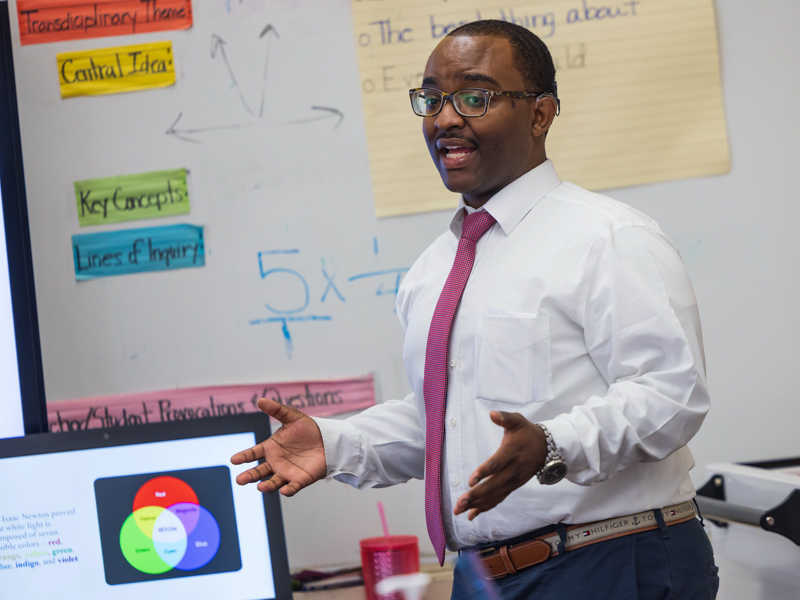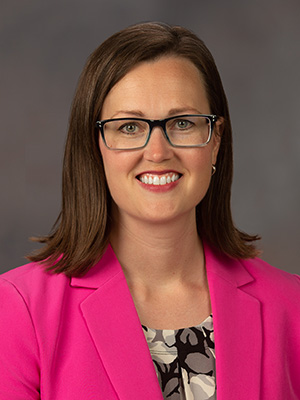Graduate student REACHes back, pays it forward by teaching

When Joe Mack Jr.’s right foot stepped over the threshold into LaSondra Brown’s classroom at Barack H. Obama Magnet Elementary School, he was greeted with a rock star’s welcome.
By the time his left foot landed, the 19 fourth graders in the second-floor classroom overlooking downtown Jackson were giddy, yet quickly pivoted to business, grabbing clean sheets of notebook paper and sharpened pencils to take notes on the day’s lesson: light.
Mack isn’t a teacher at the Jackson school. He’s both a pharmacy technician and student at the University of Mississippi Medical Center.
The Jackson native, who will earn his master’s degree in biomedical sciences in May, is also a volunteer with Project REACH (Reaching Education and Changing Healthcare), a partnership between UMMC and Obama Elementary.
The program was created to enrich the teaching and learning of science at the International Baccalaureate school, exposing underrepresented students to medical sciences careers and creating a pool of Mississippians equipped to serve the state’s health care needs.

On this chilly March morning the first week of spring, as Mack explained the physics of light and how refraction, reflection and absorption affect the colors we see, not a writing hand in the classroom was idle.
And when, after each PowerPoint slide, he asked questions to gauge who was paying attention, not a hand wasn’t raised at least once, with students demonstrating not only detailed note-taking skills, but a keen comprehension of rather complex scientific concepts.
Isabella Burrell, 10, answered most of the questions, and at the end, summarized the lesson in precise detail.

“I like that Mr. Mack is creative in his lesson plans and makes it fun,” said Burrell, whose future career is a toss-up between nurse and veterinarian.
Students from the School of Graduate Studies in the Health Sciences teach lessons once a month to the Obama Elementary students.
“Every year there’s one volunteer who tends to get really involved,” said Beth West Roach, REACH and IB coordinator at the elementary school. “This year, Mr. Mack is that volunteer.”
That Mack is able to teach the class is in itself a lesson in science. Diagnosed with profound to severe sensorineural hearing loss at 18 months, he was fitted with hearing aids, spent the next five years at Magnolia Speech School and at 6, was mainstreamed to public school in first grade. After sixth grade, his right hearing aid no longer served his needs.
“Here I testify that God told me it was time to be implanted,” said Mack, who, in 2010, underwent a cochlear implantation in his right ear at the Batson Tower of Children’s of Mississippi.
The surgically implanted device consists of an external part that sits behind the ear and an internal part placed under the skin. Included are a microphone that picks up sound, a speech processor that arranges those sounds, and a transmitter and stimulator that receive those signals, converting them into electric impulses.
The technology changed his life.
“It changed how I could hear. I could listen to the wind whisper, a bird's wing fluttering and a nearby classmate sliding their paper across the desk – seemingly simple things people can take for granted.”
Three years later, he received his second implant – in his left ear – on the first day of high school.
Long before receiving cochlear implants, Mack, who earned a bachelor’s degree in biological sciences from Belhaven University, had dreams of becoming a physician, but his journey has made that goal more purposeful.
“My lifelong experience as a UMMC audiology patient has given me insight into how people see and feel their health care experience. It will make me a more robust health care provider because I can relate to and ease whatever my patients feel, improving their overall well-being.”
Though his immediate plans post-graduation are to continue working as a pharmacy tech, Mack will “walk through whatever doors God opens for me. I will apply to medical school at the right time.”

Dr. Hanna Broome, SGSHS associate dean of student affairs and recruitment, and REACH coordinator, is proud of the partnership because it creates opportunities for graduate students to gain valuable teaching skills and the elementary students to learn not only more about science, but the personal journeys of their volunteer teachers.
“I know that the elementary students have benefited from Joe's teaching passion and style and are also encouraged to know that he is doing all of these great things – earning a master's, volunteering to teach, researching – with an added day-to-day challenge of his hearing deficit,” said Broome.
Mack’s lesson on light was his fourth of the year. Earlier topics included the function of organs on the respiratory system and distinguishing between fact and opinion in health information.
Because he has always wanted to teach, Mack viewed REACH as an opportunity to get hands-on experience.
“It takes a great deal of discipline and preparation,” he said. “Students expect and trust you to know the subject. So, I hold myself accountable accordingly.”
Said Riley Cancer, 10, a future pediatrician, “He teaches us things we may have learned about before, but he gives us more information.”
Jones said Mack’s lessons have allowed her students to dive deeper into science lessons, often not possible because of limited classroom instructional time.
“He has an interactive activity or model with each presentation,” she said. “This has piqued my students’ interest in the human body, and they have done awesome on the units.”
If this group of fourth graders is any indication, there may not be a shortage of future health care professionals in Mississippi. Nine – nearly half – in Jones’ class alone aspire to work in the field.
Mack is happy to pay it forward, giving back to the next generation to, in some part, show his gratitude to all who have been instrumental in his journey.
“Being an instructor has taught me that I learn from the students just as much as I teach the students. And the most incredible thing is I love every bit of it. I also do my best to ensure they are heard because school may be the only place they are seen.”


